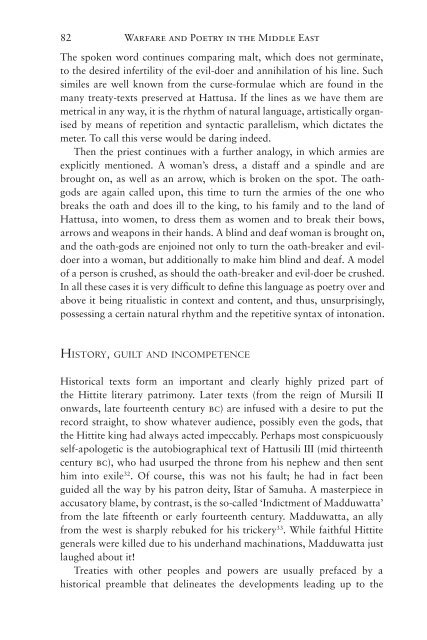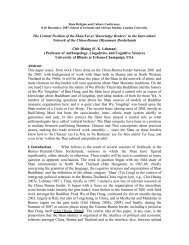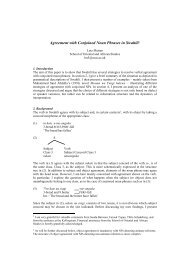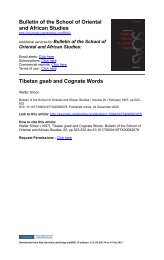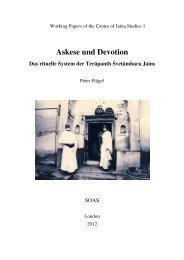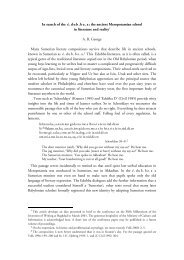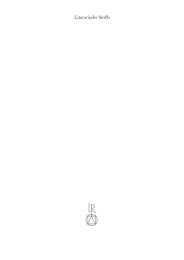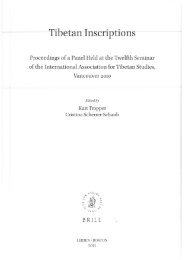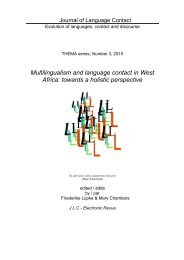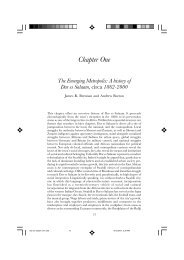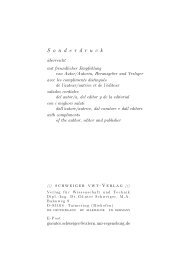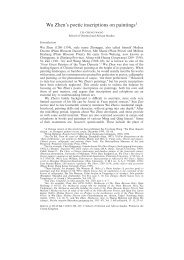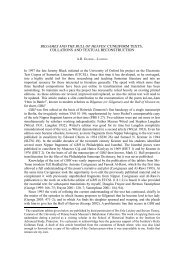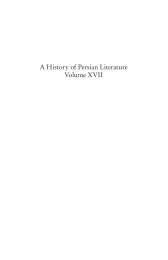Download (549Kb) - SOAS Research Online
Download (549Kb) - SOAS Research Online
Download (549Kb) - SOAS Research Online
You also want an ePaper? Increase the reach of your titles
YUMPU automatically turns print PDFs into web optimized ePapers that Google loves.
82 Warfare and Poetry in the Middle East<br />
The spoken word continues comparing malt, which does not germinate,<br />
to the desired infertility of the evil-doer and annihilation of his line. Such<br />
similes are well known from the curse-formulae which are found in the<br />
many treaty-texts preserved at Hattusa. If the lines as we have them are<br />
metrical in any way, it is the rhythm of natural language, artistically organised<br />
by means of repetition and syntactic parallelism, which dictates the<br />
meter. To call this verse would be daring indeed.<br />
Then the priest continues with a further analogy, in which armies are<br />
explicitly mentioned. A woman’s dress, a distaff and a spindle and are<br />
brought on, as well as an arrow, which is broken on the spot. The oathgods<br />
are again called upon, this time to turn the armies of the one who<br />
breaks the oath and does ill to the king, to his family and to the land of<br />
Hattusa, into women, to dress them as women and to break their bows,<br />
arrows and weapons in their hands. A blind and deaf woman is brought on,<br />
and the oath-gods are enjoined not only to turn the oath-breaker and evildoer<br />
into a woman, but additionally to make him blind and deaf. A model<br />
of a person is crushed, as should the oath-breaker and evil-doer be crushed.<br />
In all these cases it is very difficult to define this language as poetry over and<br />
above it being ritualistic in context and content, and thus, unsurprisingly,<br />
possessing a certain natural rhythm and the repetitive syntax of intonation.<br />
HISTORY, GUILT AND INCOMPETENCE<br />
Historical texts form an important and clearly highly prized part of<br />
the Hittite literary patrimony. Later texts (from the reign of Mursili II<br />
onwards, late fourteenth century bc) are infused with a desire to put the<br />
record straight, to show whatever audience, possibly even the gods, that<br />
the Hittite king had always acted impeccably. Perhaps most conspicuously<br />
self-apologetic is the autobiographical text of Hattusili III (mid thirteenth<br />
century bc), who had usurped the throne from his nephew and then sent<br />
him into exile 32 . Of course, this was not his fault; he had in fact been<br />
guided all the way by his patron deity, Ištar of Samuha. A masterpiece in<br />
accusatory blame, by contrast, is the so-called ‘Indictment of Madduwatta’<br />
from the late fifteenth or early fourteenth century. Madduwatta, an ally<br />
from the west is sharply rebuked for his trickery 33 . While faithful Hittite<br />
generals were killed due to his underhand machinations, Madduwatta just<br />
laughed about it!<br />
Treaties with other peoples and powers are usually prefaced by a<br />
historical preamble that delineates the developments leading up to the<br />
03_Warfare&Poetry_Ch3_073-098.indd 82 06/02/2013 10:15


